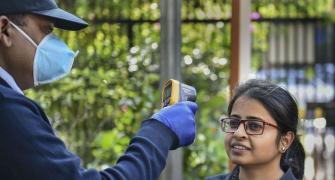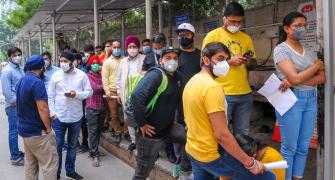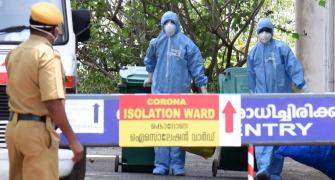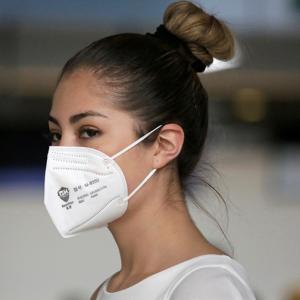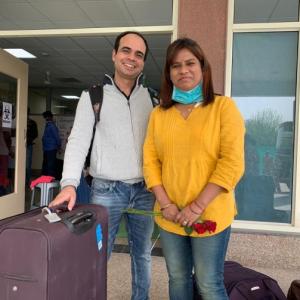'If everybody with flu symptoms approach hospitals, it will create a very difficult situation for our health system.'
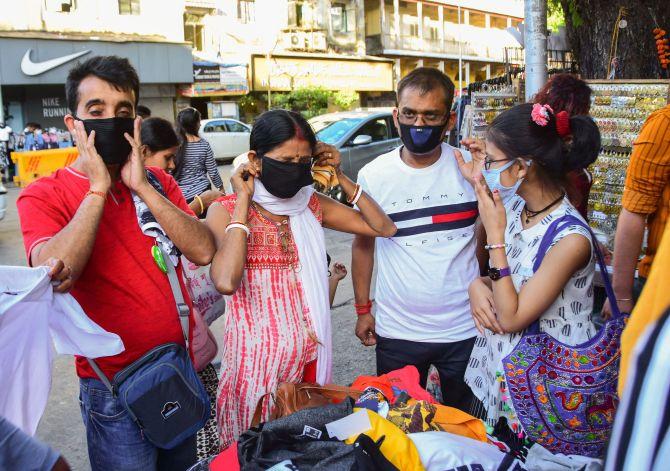
Over 100 people have tested positive for coronavirus so far across the country.
What precautions should the public take to guard against the coronavirus?
"As a country, we need to be very cautious and vigilant as there is a potential danger that it may spread faster if preventive steps are not exercised," Dr Vaibhav Agavane, an epidemiologist by training who is currently a faculty member at the Institute of Public Health, Bengaluru, tells Rediff.com's Shobha Warrier.
Now that WHO has declared the coronavirus a pandemic, how serious is the situation for India and the rest of the world?
The word pandemic is a reflection of the geographical spread of the infection globally. WHO declaring covid-19 a pandemic does reflect a serious situation at the global level.
When you look at the situation in India, I don't think it is a scary situation and is not out of control at this point of time.
If you see the spread of covid-19 in India compared to many other countries like China, which had more than 80,000 cases, it is not enormous at this point of time. After China, Italy, South Korea and Iran also reported many cases.
Compared to these countries, the number of cases in India is negligible. So, it is not a scary situation at present.
But we as a country need to be very cautious and vigilant as there is a potential danger that it may spread faster if preventive steps are not exercised.
The WHO director-general says the worst is yet to come. The virus spread from China to Italy to South Korea to Iran and many other countries. How prepared should India for a possible outbreak?
We do not know how this pandemic will turn out in future though one can predict the way it spreads in a country based on the data available from other countries, with some assumptions. It will be influenced by how countries respond to it.
India has responded well in such circumstances in the past, such as the Nipah outbreak in 2018.
We certainly should be very well prepared; there is no doubt about it. We were also prepared when Ebola hit African countries such as Sierra Leone, Guinea. Fortunately, it did not affect India.
India has quarantined itself by cancelling all visas. Is it a good way to fight the virus?
It is open to debate, but this measure has been used by many countries so far to contain the covid-19 spread.
The initial cases in India also have nationals from countries like China, Italy etc so India also can possibly stop people carrying the virus coming to India. This measure is likely to be more useful in the early phases of the outbreak which India has.
It is said the virus remains inactive within the human body for at least two weeks before the symptoms appear. In such a situation, how should people prepare themselves?
It is a regular phenomenon for any infectious disease to have an incubation period. It is not specific to coronavirus alone. The incubation period varies from disease to disease.
After a virus enters a human body, it takes some time for it to start replicating itself and reach a sufficient number leading to illness and showing symptoms like fever, body ache, etc.
In the case of covid-19, the data shows the incubation period is somewhere between 5 and 14 days.
Can a person with a virus during the incubation period pass it on to another person?
Recent research shows that it is possible.
Even when a person is asymptomatic, he or she can pass the virus to somebody else.
I am confident that as more research happens, we will know more details in future. It is a novel virus, we yet do not know all the aspects of this viral disease.
What are the symptoms that people should look for? Even for the general flu, the symptoms seem to be the same.
On the basis of symptoms alone, no one can confidently say that a person has covid-19 infection.
Apart from symptoms like that of a viral infection, if the person was in touch with a covid-19 case, or the person has travelled to a country where there are many covid-19 cases, the chances of s/he getting infected are high.
Then the person with such symptoms should contact the health facilities, get screened and tested for covid-19.
Responsible behaviour on the part of citizens will be crucial in such a situation.
I will advise people to be very forthcoming if they have symptoms and a history of international travel or contact with suspected or confirmed covid-19 patients.
At the same time, they should also exercise their judgement as not everybody with such symptoms will have covid-19.
If everybody with flu symptoms approach hospitals, it will create a very difficult situation for our health system.
So, based on the symptoms, we cannot differentiate between whether a person has flu or covid-19...
Yes, based on the symptoms alone, we cannot differentiate. The best way is to approach the health authorities and based on the history of travel and contacts, they can assess whether he or she is a covid-19 suspect and diagnose accordingly.
People treat general flu with paracetamol. How long should a person with the symptoms of flu wait before going to hospital?
Typically, general flu will go on for a few days to two weeks. But if the person has the symptoms, and s/he feels breathless and health is deteriorating, I will say s/he should approach the doctor.
But the important point is knowing that if one has travelled to affected countries recently or was in contact with covid-19 patient.
People are asked to use masks in public places, wash hands frequently and keep a distance of two metres from others. Is that enough?
Yes. These are good precautions.
But WHO has not asked each and every person to use the mask in a community setting.
If you have a cold or any other symptom related to the flu, it is better you use a mask so that you will not spread the virus to others.
If we use a mask, can we stop ourselves from getting infected?
Using the mask along with frequent hand washing is a better measure than using a mask alone.
I would say using both measures together will raise chances that one does not contract viral infections very easily.
How often should people wash their hands?
If you are taking care of someone who has a viral infection, it is better to wash hands frequently and properly while caring for that person.
If you are in a community setting like in an office, it is better to wash hands after you touch another person who has viral illness.
The virus comes out in droplets when you cough or sneeze. The droplets will be on your hand, and when you touch another person, it can be transmitted.
And if that person touches his eyes, nose or mouth, the virus will be transferred to that person's body.
So better to wash hands after coughing or sneezing.
It is important to remember that one should wash hands using the steps WHO recommends and the duration should be 20 seconds.
When an infected person touches the railings or a wall or a bench in a park, s/he spreads the virus there. Does that mean people should avoid public places?
Right now, we do not have a large number of cases in India, so the chances of someone catching covid-19 in this way is very, very minimal.
But surely, it is better to avoid crowded places where there are a lot of people and the chances of you coming in close contact with others are high.
 You must also remember that this is a virus, and it cannot remain outside a human body for long.
You must also remember that this is a virus, and it cannot remain outside a human body for long.
We do not know with certainty how long it can survive outside the human body although there are some estimates published recently.
The important thing to remember is that this is not the primary way the SARS CoV 2 has been spreading. It is primarily spreading through human to human contact, thus exercising precautionary measures, such as hand washing, is very important.
Some say the virus can remain alive for at least two hours outside the human body. Is it true?
It can certainly survive outside the human body (for example on some plastic or metal surfaces) for some time depending on many factors like the temperature outside.
There is no exact threshold on how long the virus will survive outside the human body as several factors influence its survival.
Is it true that in high temperatures, for example above 28 degree centigrade, the virus cannot survive?
If it is true, compared to cold countries, is India safe because the normal temperature is high here?
In general, many viruses do not spread easily in hot conditions, such as flu and thus have seasonal spreads. But in the case of coronavirus, we are not sure yet.
Is this a warning to India and the rest of the world to take a serious look at the healthcare system?
For example, except in Kerala, we do not have a robust healthcare system in India.
Yes, this virus is described as 'once in a century pathogen' and it has disrupted the global economy itself in a big way. Many countries are not responding well, and this can certainly be regarded as a warning for such countries.
In India, we have not recorded many cases till now, although potentially there may be many more cases which are yet to be traced, diagnosed and recorded.
I feel we have a robust system as we were able to respond quite well to outbreaks in past such as the Nipah outbreak.
The spread of covid-19 in India is a learning experience in a way, not only for governments, but also for the general public.
We should respond well, learn well from experience and be prepared in future.

